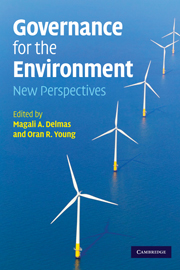Book contents
- Frontmatter
- Contents
- List of figures
- List of tables
- List of contributors
- Preface
- PART I Central threads and analytic perspectives
- PART II Governance for solving environmental problems: perspectives from economics, political science, and management
- 2 Environmental governance: an economic perspective
- 3 Environmental governance and political science
- 4 Self-regulatory institutions for solving environmental problems: perspectives and contributions from the management literature
- PART III The effectiveness of governance for sustainable development
- PART IV Conclusion
- References
- Index
3 - Environmental governance and political science
Published online by Cambridge University Press: 05 June 2012
- Frontmatter
- Contents
- List of figures
- List of tables
- List of contributors
- Preface
- PART I Central threads and analytic perspectives
- PART II Governance for solving environmental problems: perspectives from economics, political science, and management
- 2 Environmental governance: an economic perspective
- 3 Environmental governance and political science
- 4 Self-regulatory institutions for solving environmental problems: perspectives and contributions from the management literature
- PART III The effectiveness of governance for sustainable development
- PART IV Conclusion
- References
- Index
Summary
Introduction
This chapter reviews the literature on environmental governance using a political science lens to examine how writings on governance have attempted to address some of the most pressing environmental challenges of our time for instance global climate change, ecosystem degradation, biodiversity loss, and the like (Young 1994; Dietz, Ostrom and Stern 2003; Millennium Ecosystem Assessment 2005). Our review suggests that a significant proportion of writings on the subject has tended to emphasize a particular agent of environmental governance as being the most effective – typically market actors, state actors and, more recently, civil society-based actors such as NGO-based and local community actors. However, a broad array of hybrid environmental governance strategies are today in practice. It is also clear that even seemingly purely market, or state, or civil society-based governance strategies have always depended for their efficacy on support from other domains of social interactions.
The ensuing discussion uses insights from a review of the literature to focus especially on emerging hybrid forms of environmental governance. Of significant interest to our review are soft governance strategies that try to align market and individual incentives with self-regulatory processes, and co-governance, which is predicated on partnerships and notions of embedded autonomy across state–market–society divisions (Evans 1996; Sonnenfeld and Mol 2002). These innovations in environmental governance can potentially be extended to engage multiple types of environmental problems and conflicts. The chapter begins with a discussion of the significant promise of hybrid forms of environmental governance for coupled human and natural systems, and provides a close examination of some of the critical problems to which these forms remain subject.
- Type
- Chapter
- Information
- Governance for the EnvironmentNew Perspectives, pp. 69 - 97Publisher: Cambridge University PressPrint publication year: 2009
- 16
- Cited by

